#traveldatascrapingservices
Explore tagged Tumblr posts
Text
MakeMyTrip Travel Datasets - Web Scraping MakeMyTrip Data
ArcTechnolabs delivers MakeMyTrip Travel Datasets, including hotel pricing, holiday packages, user reviews, and seasonal trends, to enhance the travel market.
Read More >> https://www.arctechnolabs.com/makemytrip-booking-datasets.php
#WebScrapingTravelData#ScrapeMakeMyTripTravelData#ExtractDataFromMakeMyTrip#TravelPriceAndReviewDatasets#TravelDataScrapingServices#WebScrapingServices#MobileAppScrapingServices
0 notes
Text
#PricingStrategies#AnalyzeHotelPricingDataInRealTime#TravelDataScrapingServices#OptimizePricingStrategies
0 notes
Text
How does Travel Scraping API Service Transform Travel Data from Booking & Expedia?
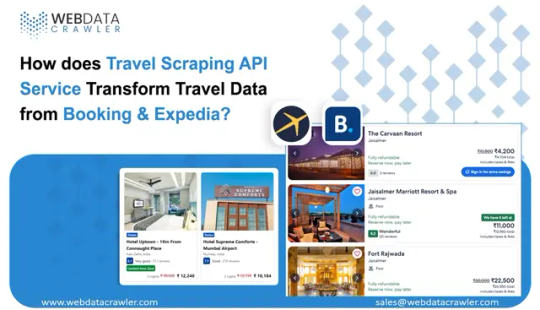
Introduction
The travel industry is inundated with vast amounts of data in the modern digital landscape. This information is crucial for making informed business decisions, from hotel prices and flight schedules to customer reviews and seasonal trends. However, retrieving and analyzing data from leading platforms like Booking.com and Expedia.com can be complex without the appropriate tools. This is where a Travel Scraping API Service proves invaluable, transforming how businesses extract, process, and utilize travel data to maintain a competitive advantage.
Understanding the Power of Travel Data
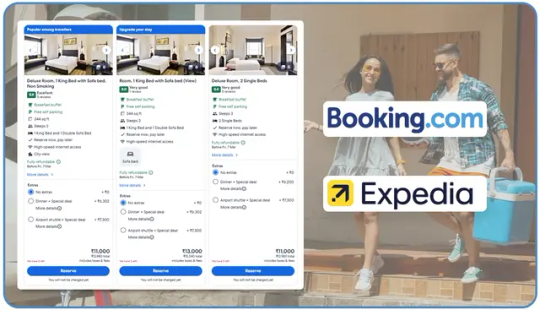
The travel industry generates an enormous volume of data every day. Every search, booking, and review contributes to this expanding information pool. For businesses in this sector, effectively accessing and analyzing this data is essential for:
Gaining more profound insights into market dynamics and consumer behavior.
Tracking pricing trends and assessing competitive positioning.
Identifying new market opportunities.
Refining revenue management strategies for maximum profitability.
Elevating the customer experience through advanced personalization.
Leading online travel agencies (OTAs) such as Booking.com and Expedia.com hold valuable data. However, obtaining this information isn’t always straightforward, as official channels often limit access. As a result, data extraction becomes a critical strategy for businesses aiming to maintain a competitive edge.
What is a Travel Scraping API Service?
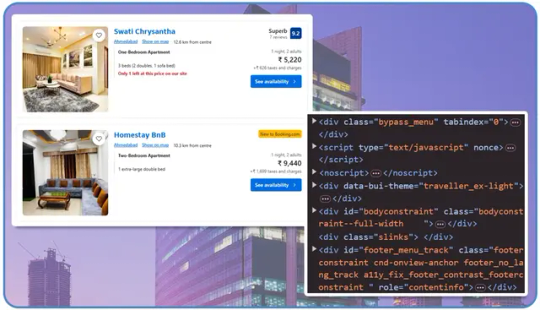
A Travel Scraping API Service is a powerful solution that efficiently extracts data from major travel platforms like Booking.com and Expedia.com. By leveraging advanced data collection techniques, this service gathers, organizes, and delivers valuable travel-related data in a structured format for businesses.
Unlike traditional manual data collection, which can be slow and prone to errors, a Travel Scraping API Service automates the process, ensuring real-time access to critical insights,
Including:
Hotel availability and pricing
Flight schedules and fares
Vacation rental options
Customer reviews and ratings
Destination popularity
Seasonal booking patterns
These services function through APIs (Application Programming Interfaces), enabling smooth integration with business systems and applications and ensuring companies have the latest travel data at their fingertips.
The Transformation Journey: From Raw Data to Actionable Insights
This process involves extracting, processing, and analyzing raw data from travel platforms to generate meaningful insights that drive strategic decision-making.
Data Extraction from Major Travel Platforms
The journey begins with Booking.com API Scraping and Expedia.com Data Scraping, leveraging advanced techniques to ensure seamless data retrieval.
This process involves:
Automated collection of both structured and unstructured data.
Managing dynamic content loaded via JavaScript.
Navigating pagination and complex site architectures.
Implementing strategies to avoid detection and IP blocks.
Handling session cookies and authentication for continuous access.
Professional Travel Industry Data Scraping services utilize sophisticated algorithms and proxy solutions to guarantee reliable and consistent data extraction without disrupting the source websites.
Data Processing and Structuring
Once the raw data is collected, it must be transformed into a structured, usable format.
This involves:
Cleaning and normalizing data for accuracy.
Eliminating duplicates and irrelevant entries.
Standardizing formats such as dates and currencies.
Categorizing and tagging data for better organization.
Building relational data structures for in-depth analysis.
For instance, Hotel Price Data Scraping results must be standardized across various room types and occupancy levels, and amenities must be included, ensuring precise and meaningful comparisons.
Data Analysis and Insight Generation
With processed data in place, the next step is extracting actionable insights to drive informed decision-making.
This includes:
Analyzing price trends across different booking windows.
Assessing competitive positioning in key markets.
Identifying demand patterns for popular destinations.
Examining customer sentiment through review analysis.
Understanding the correlation between pricing strategies and booking volumes.
Leading Travel Scraping API Service providers integrate AI and machine learning algorithms to refine data analysis further. These technologies uncover hidden patterns and trends, offering deeper intelligence beyond traditional analytical methods.
Key Data Types Extracted from Travel Websites
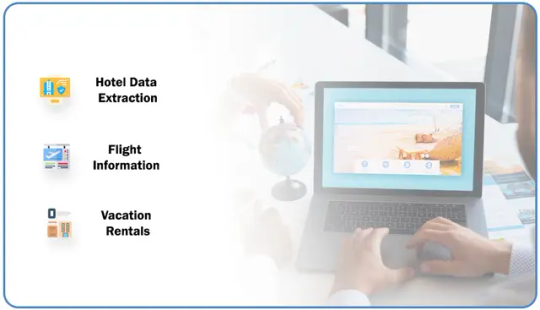
Essential travel data categories gathered from online sources for market insights and strategic decisions.
Hotel Data Extraction
Collecting real-time hotel-related data, including pricing, availability, reviews, and amenities, to analyze market trends and improve decision-making.
Hotel Price Data Scraping provides critical insights, including:
Room rates across various dates and booking periods.
Availability trends and demand fluctuations.
Discount strategies and promotional offers.
Package deals and bundled services.
The loyalty program benefits frequent guests.
Amenity offerings and service comparisons.
Guest reviews and ratings shaping consumer perception.
This data enables hotels to refine pricing models, track competitor strategies, and identify emerging market opportunities.
Flight Information
Essential travel data covering flight schedules, pricing, availability, and airline details, helping businesses optimize travel strategies.
Flight Data Extraction uncovers key insights such as:
Fare variations across different booking windows.
Route popularity and demand trends.
Airline competitive positioning and pricing strategies.
Schedule changes and operational adjustments.
Seasonal demand patterns affecting ticket pricing.
Ancillary service offerings like baggage fees and seat selection.
Airlines and travel agencies leverage this data for strategic route planning, optimized pricing, and targeted marketing.
Vacation Rentals
Short-term lodging options, such as apartments, houses, or villas, are listed on platforms like Airbnb and Vrbo, catering to travelers seeking flexible accommodations.
Vacation Rental Data Scraping delivers valuable insights into:
Property availability and booking trends.
Pricing strategies are based on demand and seasonality.
Location popularity among travelers.
Amenity preferences shape guest expectations.
Host ratings and service reliability.
Booking patterns across platforms.
Seasonal trends affecting rental demand.
This intelligence is essential for property managers, investors, and vacation rental platforms to optimize pricing, enhance guest experiences, and improve occupancy rates.
Optimizing Travel Data Extraction with Advanced Web Scraping Services
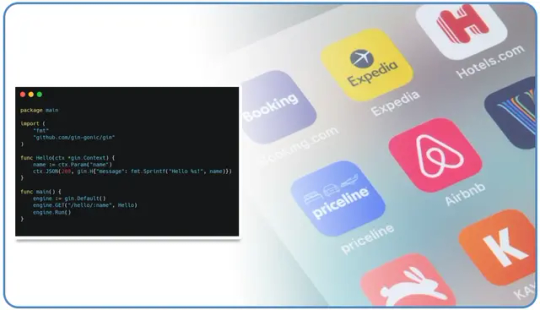
Access to accurate, real-time data is crucial in the competitive travel industry. Businesses leverage Travel Data Scraping Services to extract and analyze key information from top travel platforms. This includes tracking airfare trends, monitoring hotel availability, and analyzing customer sentiment for informed decision-making.
A primary use of web scraping in travel is Dynamic Pricing Data Extraction. Airlines, hotels, and OTAs adjust prices based on demand and competition. Real-time data extraction helps businesses optimize pricing, develop competitive strategies, and boost revenue.
Selecting the Best Web Scraping Tools For Travel Websites is essential for handling complex site structures, dynamic content, and anti-scraping defenses. These tools ensure efficient data retrieval from Booking.com, Expedia.com, and Airbnb.
To maintain efficiency, businesses must follow Travel Industry Data Scraping Best Practices, like rotating proxies, AI-driven parsing, and automated scraping schedules. Ethical data collection ensures compliance with regulations and platform terms.
For tailored solutions, Custom API Scraping Solutions For Travel Websites provide real-time structured data, benefiting travel aggregators, comparison websites, and analytics firms seeking to enhance their offerings.
Extracting Hotel And Flight Prices From APIs
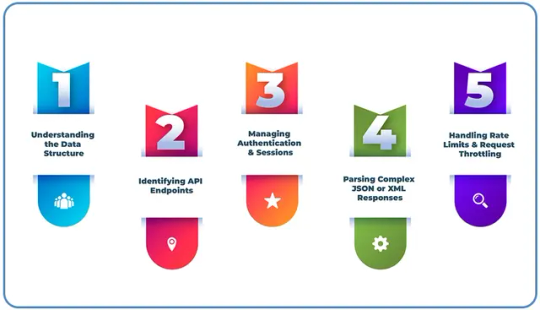
Extracting Hotel And Flight Prices From APIs requires a strategic approach to ensure accuracy and efficiency.
Here’s a breakdown of key considerations:
Understanding the Data Structure: Analyzing how travel websites organize and present hotel and flight pricing information.
Identifying API Endpoints: Using browser developer tools to locate and access relevant API endpoints.
Managing Authentication & Sessions: Implement authentication mechanisms and handle session persistence to maintain seamless data retrieval.
Parsing Complex JSON or XML Responses: Structuring and processing intricate data formats to extract relevant pricing details.
Handling Rate Limits & Request Throttling: Optimizing request frequency to comply with API restrictions and prevent access blocks.
Businesses can automate these processes by leveraging professional services for seamless and scalable data extraction, even as travel websites update their security protocols and data structures.
Web Scraping for Market Trend Analysis in Travel
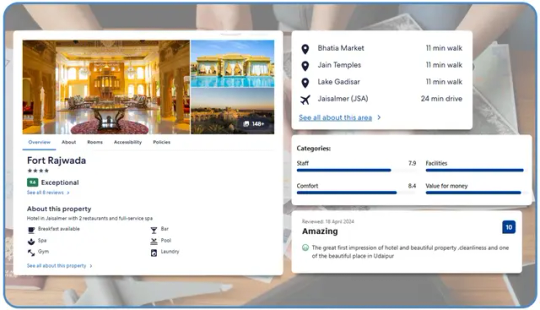
Leveraging Web Scraping For Market Trend Analysis In Travel allows businesses to systematically gather vast amounts of data over time, unveiling critical patterns and industry shifts.
By extracting and analyzing real-time travel-related data, companies can gain valuable insights, including:
Tracking price fluctuations across booking windows to optimize pricing strategies and maximize revenue.
Monitoring seasonal demand variations to align marketing efforts with peak travel periods.
Identifying emerging destinations to stay ahead of shifting traveler preferences.
Analyzing competitor promotional strategies to refine offers and enhance competitive positioning.
Assessing the impact of external events on travel demand to make informed, data-driven decisions.
By harnessing these insights, businesses can proactively adapt to market changes, ensuring they remain competitive and responsive rather than reactive.
How Web Data Crawler Can Help You?

We specialize in delivering comprehensive data extraction solutions tailored for the travel industry. With a blend of technical expertise and industry knowledge, our team ensures high-quality, reliable data that empowers businesses to make informed decisions and drive growth.
Our Services Include:
Customized scraping solutions designed to meet your unique business requirements
Regular data delivery via API or structured reports for seamless access
Comprehensive data cleaning and normalization to ensure accuracy and consistency
Integration support to align with your existing systems effortlessly
Ongoing maintenance to guarantee uninterrupted data flow
Unlike standard Web Scraping API providers, we recognize the complexities of travel data and the challenges of extracting information from platforms like Booking.com and Expedia.com.
Our solutions are crafted to deliver:
Superior data quality through advanced validation techniques
Exceptional reliability with built-in redundancy for uninterrupted service
Customizable data formats tailored to your specific business needs
Scalable infrastructure that evolves as your requirements grow
Expert support from professionals with deep technical and industry expertise
With us, you gain a trusted partner dedicated to providing actionable insights and scalable solutions that fuel business success.
Conclusion
In today’s competitive travel industry, data is the key to success. An influential Travel Scraping API Service converts raw information into actionable insights, helping businesses make informed decisions across operations.
From refining pricing strategies to spotting emerging market opportunities, data from platforms like Booking.com and Expedia.com fuels sustainable growth and a competitive edge.
Unlock the potential of travel data with us. Our experts will craft a customized solution tailored to your data needs while ensuring compliance with industry standards. Don’t let valuable insights go untapped.
Contact Web Data Crawler today to transform data into your most powerful asset and drive success in the travel industry.
Originally published at https://www.webdatacrawler.com.
#APIScrapingServices#BookingComAPIScraping#ExpediaComDataScraping#TravelIndustryDataScraping#HotelPriceDataScraping#FlightDataExtraction#VacationRentalDataScraping#WebScrapingServices#TravelDataScrapingServices#DynamicPricingDataExtraction#BestWebScrapingToolsForTravelWebsites#HowToScrapeBookingComAndExpediaData#ExtractingHotelAndFlightPricesFromAPIs#WebScrapingForMarketTrendAnalysisInTravel#TravelIndustryDataScrapingBestPractices#CustomAPIScrapingSolutionsForTravelWebsites#WebDataCrawler#WebScrapingAPI
0 notes
Text

Analyze real-time flight information by web scraping Google flight data for better travel decisions and pricing.
Source: https://www.iwebdatascraping.com/web-scraping-google-flight-data-boost-travel-insights.php
#ScrapingGoogleFlightData#WebScrapingGoogleFlightData#ScrapeFlightPriceData#FlightPriceDataScraper#TravelDataScrapingServices
0 notes
Text

Viator Data Scraping enables competitive analysis, personalized recommendations, real-time availability, and dynamic pricing for B2B and B2C businesses.
Know More: https://www.iwebdatascraping.com/viator-data-scraping-help-b2b-and-b2c-businesses.php
#ViatorDataScrapingHelpB2BAndB2CBusinesses#ScrapeViatorDataHelpB2BAndB2CBusinesses#ScrapingdatafromViator#ViatorExtractor#traveldatascrapingservices
0 notes
Text

#TravelDataScrapingServices#AirlineDataScraping#AirlineDataMining#TravelDataCollection#AirlineDataCollection
0 notes
Text
TripAdvisor Travel Datasets - Web Scraping TripAdvisor Travel Data
Access TripAdvisor travel datasets with web scraping TripAdvisor travel data for prices, listings, availability, and review analysis.
Read More >> https://www.arctechnolabs.com/tripadvisor-travel-data-scraping-services.php
#TripAdvisorTravelDatasets#ScrapingTripAdvisorTravelData#TravelDataScrapingServices#TravelPriceDatasets#TravelWebScrapingDatasets#TravelDataScraping#WebScrapingServices#ArcTechnolabs
0 notes
Text

Scraping Google Flights, Booking.com & Airbnb Data
Scraping Google Flights, Booking.com, and Airbnb for Price & Trend Insights helps uncover travel deals, monitor fluctuations, and forecast booking behavior.
Read More >> https://www.arctechnolabs.com/google-flights-booking-airbnb-price-trend-scraping.php
#WebScrapingBookingComTravelData#WebScrapingAirbnbTravelData#ScrapingGoogleFlightsForTravelPrice#TravelPriceReviewDatasets#TravelDataScrapingServices#MobileAppScrapingServices#ArcTechnolabs
0 notes
Text
Scraping Google Flights, Booking.com & Airbnb Data
Scraping Google Flights, Booking.com, and Airbnb for Price & Trend Insights helps uncover travel deals, monitor fluctuations, and forecast booking behavior.
#WebScrapingBookingComTravelData#WebScrapingAirbnbTravelData#ScrapingGoogleFlightsForTravelPrice#TravelPriceReviewDatasets#TravelDataScrapingServices#MobileAppScrapingServices#ArcTechnolabs
0 notes
Text
The Role of Data Scraping in Hotel Price Comparison & Travel Analytics
Introduction
In the highly competitive travel and hospitality industry, pricing strategies play a crucial role in attracting customers. Travelers constantly compare hotel prices across multiple platforms to find the best deals. This has led to a surge in demand for automated solutions that can gather and analyze hotel pricing data in real time. Actowiz Solutions leverages hotel price data scraping and travel analytics to empower businesses with valuable insights. This blog explores the significance of data scraping in hotel price comparison and travel analytics, showcasing its impact on decision-making and customer satisfaction.

Understanding Hotel Price Scraping
Hotel price scraping involves extracting pricing data from various sources, including:
Online Travel Agencies (OTAs) like Booking.com, Expedia, and Agoda
Hotel websites
Metasearch engines such as Google Hotels and Trivago
Competitor platforms
With real-time hotel data extraction, businesses can monitor pricing trends, detect fluctuations, and adjust rates dynamically.
Benefits of Hotel Price Data Scraping
1. Competitive Pricing Strategy
Data scraping helps hotels and travel agencies analyze competitor pricing and set optimal rates. With dynamic pricing algorithms, businesses can adjust their prices based on demand, seasonality, and competitor movements.
2. Enhanced Customer Experience
By providing accurate and competitive prices, businesses can enhance customer satisfaction. Actowiz Solutions' data scraping services help travel companies maintain transparency and deliver the best deals to customers.
3. Revenue Optimization
Real-time hotel data scraping enables revenue managers to identify price gaps and maximize revenue. By integrating AI-driven analytics, businesses can predict demand and optimize pricing strategies accordingly.
4. Market Trends Analysis
Analyzing historical pricing trends helps businesses understand seasonal demand and consumer preferences. Actowiz Solutions provides customized travel data scraping services to track these insights effectively.
5. Fraud Detection & Price Parity Monitoring
Hotels need to ensure consistent pricing across all distribution channels. With price monitoring tools, businesses can identify pricing discrepancies and prevent revenue leakage due to unauthorized discounts.
Role of Data Scraping in Travel Analytics
1. Demand Forecasting
By scraping data from hotel booking platforms and customer reviews, businesses can predict future demand and plan inventory management accordingly.
2. Sentiment Analysis
Actowiz Solutions leverages hotel review data extraction to perform sentiment analysis. By analyzing guest feedback, hotels can improve service quality and customer engagement.
3. Competitor Benchmarking
Comparing hotel ratings, pricing structures, and promotional offers enables businesses to stay ahead of the competition. With hotel price intelligence tools, businesses gain a competitive edge.
4. Personalized Marketing Strategies
Travel agencies and hotel chains can use customer preference data to create personalized offers and targeted marketing campaigns, enhancing conversion rates.
How Actowiz Solutions Simplifies Hotel Price Scraping
Actowiz Solutions provides cutting-edge web scraping tools to extract, analyze, and visualize hotel pricing data. Our services include:
Real-time data extraction for accurate pricing insights
Automated hotel price monitoring for dynamic pricing adjustments
Integration with BI tools for data visualization
Custom APIs for seamless access to travel data
Conclusion
With data-driven insights, hotels and travel agencies can stay competitive, optimize revenue, and improve customer satisfaction. Actowiz Solutions offers advanced hotel data scraping and travel analytics services, enabling businesses to harness the power of real-time data. Contact us today to transform your pricing strategy with cutting-edge web scraping solutions!
Learn More
#PricingStrategies#AnalyzeHotelPricingDataInRealTime#TravelDataScrapingServices#OptimizePricingStrategies
0 notes
Text
Web Scraping Google Flight Data: Boost Travel Insights

How Can Web Scraping Google Flight Data Enhance Your Travel Business?
The modern travel industry relies heavily on data to optimize consumer experiences and business strategies. Travelers seek the best deals, while businesses aim to offer competitive pricing. Access to accurate, real-time flight data is crucial for achieving these goals. Google Flights has become a key platform in the online travel industry, enabling users to search for flights, compare prices, and book trips efficiently. By leveraging web scraping Google Flight data, businesses can access information that supports price monitoring, market analysis, and strategic planning. Google Airline's data scraping services allow companies to stay ahead of the competition by offering insights into pricing trends and consumer behavior. Travel data scraping services empower businesses to optimize their offerings, improve customer satisfaction, and enhance decision-making processes in a highly competitive market. This approach ensures that travelers and businesses benefit from the rich data on Google Flights.
The Role of Google Flights in the Travel Ecosystem
Google Flights has revolutionized how travelers search for and book flights. Its user-friendly interface and powerful search capabilities allow users to compare prices across airlines, dates, and routes within seconds. The platform aggregates data from numerous airlines and travel agencies, providing a centralized hub for flight information.
Having access to this data is crucial for businesses in the travel industry. Airlines, travel agencies, and price comparison websites can use this data to understand market trends, optimize pricing strategies, and enhance customer experiences. Scrape Google Flight price data to help businesses extract and analyze this information at scale, giving them a competitive edge in a rapidly evolving market. Utilizing Travel and Airline Data Collection enables companies to stay ahead of trends, offering informed decision-making that enhances business operations and customer satisfaction.
The Value of Web Scraping Google Flight Data
Web scraping Google Flight data can unlock a wide range of insights, making it a valuable tool for various stakeholders in the travel industry. Here's how different entities can benefit from this data:
1. Airline Companies: Understanding how their pricing compares to competitors is critical for airlines. Web scraping Google Flight data allows airlines to monitor competitor prices in real time, enabling them to adjust their pricing strategies dynamically. Airlines can also identify patterns and trends that inform future pricing decisions by analyzing historical pricing data. Additionally, airlines can track consumer behavior, such as preferred travel dates, routes, and booking windows, to tailor their offerings and marketing campaigns. Utilizing a Google Flights Data Scraper ensures that airlines have the most accurate and up-to-date information.
2. Travel Agencies: Travel agencies can use scraped flight data to enhance customer offerings. By analyzing flight prices across different airlines and routes, agencies can provide customers with the best deals, increasing their chances of booking through the agency. Moreover, access to real-time flight data allows agencies to offer personalized recommendations based on a customer's travel history and preferences. This level of customization can significantly improve customer satisfaction and loyalty. By leveraging a Flight Price Data Scraper, travel agencies can ensure they are always offering competitive prices and relevant travel options.
3. Price Comparison Websites: Price comparison websites rely heavily on accurate and up-to- date data. By scraping Google Flight data, these platforms can offer users the most competitive prices. In addition to displaying current prices, these websites can analyze historical data to predict future price trends, helping users decide when to book their flights. This predictive capability can be a significant differentiator in a crowded market. Using a Google Flights Data Scraping API helps price comparison websites maintain a constant flow of fresh data, keeping their platforms relevant and trustworthy for users.
4. Market Researchers and Analysts: Google Flight data provides consumer behavior and market dynamics information for market researchers and analysts. By analyzing this data, researchers can identify trends in travel demand, such as popular routes, peak travel periods, and emerging destinations. This information can inform business strategies, from airline route planning to marketing campaigns for travel agencies. The ability to Extract Travel Data from Google Flights gives researchers the comprehensive datasets they need to uncover meaningful insights and stay ahead in the industry.
In conclusion, web scraping Google Flight data is a powerful tool across the travel industry. The possibilities are vast, whether it's to extract Airline price data for competitive analysis or to leverage web scraping flight data for customer personalization. Travel industry stakeholders can use this data to refine their strategies, enhance their services, and ultimately stay competitive in a rapidly evolving market.
How Web Scraping Enhances Travel Experiences
Beyond business applications, web scraping Google Flight data can significantly enhance the travel experience for individual consumers. By analyzing flight data, travelers can make more informed decisions about when and where to travel. Here's how:
1. Finding the Best Deals: One of the most significant benefits of web scraping Google Flight data is finding the best deals. Travelers can identify the optimal time to book their flights by analyzing price fluctuations over time. For example, they might discover that prices for a particular route tend to drop on certain days of the week or during specific times of the year. With this information, travelers can book their flights at the most cost-effective time, potentially saving hundreds of dollars. This process involves Scrape Flight Prices & Schedules data, ensuring access to the most accurate pricing trends.
2. Understanding Price Trends: Travelers can also use scraped data to understand broader price trends. For instance, by analyzing historical data, they might notice that prices for flights to a particular destination increase during peak travel seasons, such as holidays or significant events. Conversely, they might find that prices drop during off-peak periods. This information allows travelers to plan their trips more strategically, choosing travel dates that align with their budget. Google Flights review data collection is crucial to this analysis, providing insights into how other travelers perceive pricing and service quality.
3. Personalized Travel Recommendations: With access to web-scraped flight data, consumers can receive personalized travel recommendations based on their preferences and previous travel behavior. For example, a frequent traveler to Europe might receive alerts when prices drop on their preferred routes. In contrast, a traveler interested in exploring new destinations might receive suggestions for flights to less popular yet affordable locations. This level of personalization can make travel planning more enjoyable and efficient. By extracting real-time data from Google Flights, travelers can ensure they are using the most current information available.
4. Optimizing Travel Itineraries: Scraping Google Flight data can also help travelers optimize their travel itineraries. For instance, by analyzing data on flight durations, layover times, and airport facilities, travelers can choose flights that offer the best combination of convenience and cost. They can also identify alternative routes that might be more affordable or offer a more comfortable travel experience. For example, a traveler might discover that a longer layover in a particular city offers the opportunity for a brief visit, adding value to their trip. Extraction, Google Flights location data, helps identify these potential layover opportunities and alternative routes, enhancing the overall travel experience.
Web scraping Google Flight data empowers travelers by providing them the tools to make informed, cost-effective decisions, leading to more enjoyable and efficient travel experiences.
Leveraging Google Flight Data for Business Strategy
Beyond enhancing the travel experience, web scraping Google Flight data can be a powerful tool for informing business strategy in the travel industry. Here are a few ways companies can leverage this data:
1. Competitive Pricing Strategies
One primary application of scraped flight data is developing competitive pricing strategies. By monitoring competitor prices in real-time, airlines and travel agencies can adjust their pricing dynamically to remain competitive. For instance, if an airline notices that a competitor has lowered prices on a particular route, it can respond by offering discounts or promotions to retain market share. This real-time responsiveness can be a critical factor in a highly competitive industry.
2. Demand Forecasting
Accurate demand forecasting is essential for optimizing travel industry operations. By analyzing historical flight data, businesses can identify patterns and trends that inform demand forecasts. For example, airlines can use this data to anticipate peak travel periods and adjust their flight schedules accordingly. Similarly, travel agencies can use demand forecasts to tailor their marketing efforts, targeting potential customers during periods of high demand.
3. Route Optimization
Route optimization is a key factor for airlines in maximizing profitability. By analyzing Google Flight data, airlines can identify underperforming routes and consider adjustments, such as changing flight frequencies or discontinuing routes altogether. Conversely, they can identify high-demand routes that warrant additional flights or larger aircraft. This data-driven approach to route optimization can significantly improve operational efficiency and profitability.
4. Customer Segmentation
Web scraping Google Flight data can also support customer segmentation efforts. Businesses can segment their customer base into distinct groups by analyzing data on traveler preferences, booking behavior, and price sensitivity. This segmentation allows for more targeted marketing efforts, such as offering premium services to high-value customers or promoting budget options to price-sensitive travelers. Ultimately, this targeted approach can enhance customer satisfaction and loyalty.
5. Enhancing Customer Experience
In today's competitive travel industry, customer experience is a key differentiator. By leveraging scraped flight data, businesses can offer their customers more personalized and convenient services. For instance, travel agencies can use this data to recommend the best flight options based on a customer's preferences, while airlines can offer personalized promotions or upgrades. Additionally, businesses can use this data to anticipate and address potential pain points, such as long layovers or inconvenient flight times, improving the overall travel experience.
Ethical Considerations and Best Practices
While web scraping offers significant benefits, it's essential to approach it with ethical considerations and best practices in mind. Here are a few key points to consider:
1. Compliance with Legal Requirements
Complying with relevant legal requirements when scraping data from Google Flights or any other platform is crucial. This includes adhering to the platform's terms of service and any applicable data protection regulations. In some cases, unauthorized scraping may violate these terms and result in legal consequences. Conducting thorough research and seeking legal advice is essential to ensure compliance.
2. Data Privacy
Data privacy is a growing concern in today's digital landscape. When scraping flight data, it's essential to ensure that no personally identifiable information (PII) is collected or used without consent. Businesses should implement robust data protection measures to safeguard the privacy of their customers and comply with relevant privacy regulations, such as the General Data Protection Regulation (GDPR).
3. Respect for Platform Integrity
Web scraping should respect the integrity and functionality of the platform being scraped. Excessive scraping activity can strain the platform's servers, potentially disrupting service for other users. To avoid this, businesses should implement measures such as rate limiting and data caching to minimize the impact of their scraping activities.
4. Transparency and Disclosure
Transparency is essential when using scraped data for business purposes. Businesses should disclose their data collection practices and how the data will be used. This transparency builds trust with customers and ensures that they are fully informed about how their data is being used.
Conclusion:
Web scraping Google Flight data is a powerful tool that can unlock many insights for businesses and travelers alike. From Flight location data scraping for optimized route planning to using a Travel Price DataSet for competitive pricing strategies, the applications of this data are vast and varied. The importance of accurate and real-time data will only grow as the travel industry evolves. However, with great power comes great responsibility. Businesses must approach web scraping with ethical considerations and best practices to ensure that they comply with legal requirements and respect the privacy and integrity of the platforms they are scraping. The future of web scraping in the travel industry is bright. As technology continues to advance, new tools and techniques will emerge.
Experience top-notch web scraping service and mobile app scraping solutions with iWeb Data Scraping. Our skilled team excels in extracting various data sets, including retail store locations and beyond. Connect with us today to learn how our customized services can address your unique project needs, delivering the highest efficiency and dependability for all your data requirements.
Source: https://www.iwebdatascraping.com/web-scraping-google-flight-data-boost-travel-insights.php
#ScrapingGoogleFlightData#WebScrapingGoogleFlightData#ScrapeFlightPriceData#FlightPriceDataScraper#TravelDataScrapingServices
0 notes
Text
#ScrapingGoogleFlightData#WebScrapingGoogleFlightData#ScrapeFlightPriceData#FlightPriceDataScraper#TravelDataScrapingServices
0 notes
Text
Travel Data Scraping Services - Extract Airline, Hotel & Rental Data
Travel data scraping services for extracting airline, hotel, and rental data. Available in India, USA, UAE, Canada, Luxembourg, and Spain to provide accurate insights.
Know more: https://www.iwebdatascraping.com/travel-app-data-scraping-services.php
#TravelDataScrapingServices#ScrapeTravelData#ExtractAirlineData#ExtractHotelData#VacationRentalDataScraping#VacationRentalAPIScraping
0 notes
Text
How Can Viator Data Scraping Help B2B And B2C Businesses Thrive In The Travel Industry?
How Can Viator Data Scraping Help B2B And B2C Businesses Thrive In The Travel Industry?
In today's travel landscape, where access to information and personalized journeys are paramount, data extraction from platforms like Viator has become increasingly pivotal. Viator is a prominent digital hub for booking tours, activities, and adventures globally, housing a vast reservoir of data. This data is invaluable to travelers, tour operators, travel agencies, and analysts. This guide aims to illuminate the significance of scraping data from Viator, providing the required techniques and the diverse applications it affords.
Viator's wealth of information is a beacon in the modern travel industry, offering insights and opportunities that shape experiences and decisions. By extracting data from Viator, stakeholders can access real-time information on tours, activities, and destinations, empowering travelers to make informed choices. For tour operators and agencies, scraping Viator data provides a competitive edge, offering insights into market trends, pricing strategies, and customer preferences. This guide will explore the methodologies for scraping data from the booking platform, including web scraping tools, API integration, and data aggregation services. Furthermore, it will elucidate the various applications of Viator data, from market intelligence and dynamic pricing to customer segmentation and performance monitoring. Through this guide, stakeholders can harness the power of Viator data scraping to navigate the evolving landscape of travel and create unforgettable experiences for travelers worldwide.
How can Viator data scraping cater to the needs of B2B and B2C?
Scraping data from Viator offers numerous advantages for both B2B and B2C, making it a valuable resource for travelers, tour operators, travel agencies, and online platforms. Here's a detailed look at why travel data scraping services is beneficial:
B2B
Competitive Analysis: For tour operators and travel agencies, scraping Viator data offers valuable insights into competitors' offerings, pricing strategies, and customer reviews. By analyzing this data, businesses can benchmark their offerings against competitors, identify gaps in the market, and develop strategic plans to stay competitive. Understanding competitors' strengths and weaknesses enables businesses to refine their product offerings, pricing strategies, and marketing approaches to attract customers and enhance their market position.
Comprehensive Listings: Viator boasts an extensive database of tours, activities, and attractions worldwide. This vast repository makes it convenient for travelers to explore diverse experiences in various destinations, all in one place. Whether seeking cultural excursions, adventurous activities, or sightseeing tours, Viator provides various options to cater to different interests and preferences.
Product Development: By analyzing scraped Viator data, B2B businesses can gain insights into popular destinations, trending activities, and customer preferences. This information informs product development efforts, enabling businesses to create tailored tour packages, unique experiences, and attractive offerings that resonate with their target audience.
Strategic Partnerships: Viator data scraping enables B2B entities to identify potential partners and suppliers within the travel industry. By analyzing data on tour operators, attractions, and activities, businesses can forge strategic partnerships, collaborate on joint ventures, and expand their network to offer their customers diverse and comprehensive travel solutions.
B2B
Personalized Recommendations: B2C platforms and travel agencies can leverage Viator data scraping to offer personalized recommendations to their customers. Analyzing data from Viator allows travel agencies and online platforms to provide personalized recommendations to users. By leveraging data on users' preferences, travel history, and demographics, businesses can offer tailored suggestions for tours and activities that align with each individual's interests and preferences. This personalized approach enhances the overall customer experience, increasing customer satisfaction and loyalty. By delivering relevant recommendations, businesses can improve conversion rates and drive repeat bookings, ultimately contributing to long-term business success.
Real-Time Availability: One of the critical benefits of scraping data from travel websites is gaining access to real-time information on availability, pricing, and booking options. By scraping data from Viator, B2C platforms can provide customers with up-to-date information on availability, pricing, and booking options. It ensures that customers can make informed decisions and secure bookings for desired experiences without delay, leading to higher satisfaction and conversion rates.
Dynamic Pricing: Viator data scraping enables B2C businesses to implement dynamic pricing strategies based on demand, seasonality, and competitor pricing. By analyzing pricing trends and availability data, businesses can adjust prices dynamically to maximize revenue and occupancy rates while offering competitive rates to customers.
However, Viator data scraping caters to the needs of both B2B and B2C sectors. It provides valuable insights for competitive analysis, product development, strategic partnerships, personalized recommendations, real-time availability, and dynamic pricing. By harnessing the power of scraped Viator data, businesses can enhance their offerings, improve customer satisfaction, and drive growth in the competitive travel industry.
Techniques for Scraping Viator Data
Regarding scraping data from Viator, several techniques are available to extract and utilize the information on the platform effectively. Here's a detailed overview of the scraping techniques for Viator data:
Web Scraping Tools: Web scraping tools like BeautifulSoup or Scrapy can extract data from Viator's website. These tools allow users to navigate the website's structure, locate relevant information such as tour descriptions, prices, and availability, and extract it in a structured format for further analysis. With BeautifulSoup, for example, users can parse HTML documents and extract specific elements by using CSS selectors or XPath expressions. Similarly, Scrapy offers a framework for building web crawlers that can systematically navigate web pages, scrape data, and store it in a desired format, such as CSV or JSON.
API Integration: Viator provides an API (Application Programming Interface) that allows developers to access and retrieve data programmatically. By integrating Viator's API into custom applications or scripts, developers can automate the data retrieval process, ensuring efficiency and accuracy. Viator's API offers endpoints for accessing various data types, including tours, activities, reviews, and bookings. Developers can request HTTP to these endpoints, authenticate themselves using API keys, and receive responses in JSON or XML format. This approach enables real-time access to Viator's data, making it ideal for applications requiring up-to-date tours and activity information.
Data Aggregation Services: Another option for collecting Viator data is to leverage data aggregation services that specialize in scraping travel-related websites. These services offer pre-built solutions for extracting and aggregating data from multiple sources, including Viator. By subscribing to these services, businesses can save time and effort associated with building and maintaining scraping scripts. Data aggregation services typically provide APIs or data feeds that deliver scraped data in a structured format, allowing businesses to integrate it into their systems or applications seamlessly. Additionally, travel scraper may offer features such as data cleansing, deduplication, and enrichment, further enhancing the quality and usefulness of the scraped data.
Thus, scraping data from Viator involves utilizing web scraping tools, integrating with Viator's API, or leveraging data aggregation services. Each approach has its advantages and considerations, depending on the project's specific requirements and technical capabilities. By employing these scraping techniques effectively, businesses can access and utilize the wealth of information available on Viator's platform to enhance their offerings and improve decision-making processes in the travel industry.
Conclusion: Viator data scraping presents many opportunities for travelers, tour operators, travel agencies, and analysts. By leveraging the wealth of information available on Viator's platform, stakeholders can gain valuable insights into market dynamics, competitor strategies, and customer preferences, enabling them to make data-driven decisions and deliver exceptional travel experiences. As the travel industry evolves, the importance of scraping data from platforms like Viator isn't ignorable. It can help stay ahead of the curve and unlock new opportunities for growth and innovation.
For a comprehensive web scraping service or mobile app data scraping solution, use iWeb Data Scraping. Our team specializes in expertly extracting retail store location data and more. Reach out today to discuss your project requirements and explore how we can enhance efficiency and reliability for your data needs.
Know More: https://www.iwebdatascraping.com/viator-data-scraping-help-b2b-and-b2c-businesses.php
#ViatorDataScrapingHelpB2BAndB2CBusinesses#ScrapeViatorDataHelpB2BAndB2CBusinesses#ScrapingdatafromViator#ViatorExtractor#traveldatascrapingservices
0 notes
Text

Viator Data Scraping enables competitive analysis, personalized recommendations, real-time availability, and dynamic pricing for B2B and B2C businesses.
Know More: https://www.iwebdatascraping.com/viator-data-scraping-help-b2b-and-b2c-businesses.php
#ViatorDataScrapingHelpB2BAndB2CBusinesses#ScrapeViatorDataHelpB2BAndB2CBusinesses#ScrapingdatafromViator#ViatorExtractor#traveldatascrapingservices
0 notes
Text
How Can Viator Data Scraping Help B2B And B2C Businesses Thrive In The Travel Industry?
Viator Data Scraping enables competitive analysis, personalized recommendations, real-time availability, and dynamic pricing for B2B and B2C businesses.
Know More: https://www.iwebdatascraping.com/viator-data-scraping-help-b2b-and-b2c-businesses.php
#ViatorDataScrapingHelpB2BAndB2CBusinesses#ScrapeViatorDataHelpB2BAndB2CBusinesses#ScrapingdatafromViator#ViatorExtractor#traveldatascrapingservices
0 notes